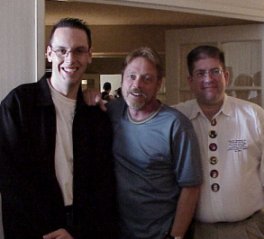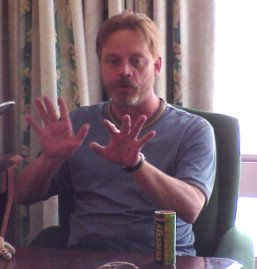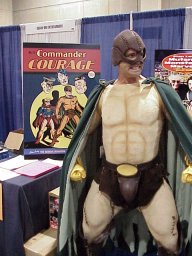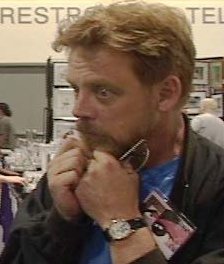|
Capturing
The Lightning:
An
Interview with Mark Hamill
|
|
|
A gracious
Mark Hamill with the Fanboy Planeteers.
Goodson is the one humming
the Imperial March through his smile.
|
Here's how it happened.
A year
and a half ago, Goodson and I were driving down to the 2002
San Diego ComicCon when my cell phone rang. On the other end
was the faint voice of a publicist (love the cell reception
on the I-5) asking if I'd be interested in meeting Mark Hamill.
At
the time, I was pretty unclear as to why Hamill would be at
the convention, but of course I said yes. After all, the kids
at Cupertino Junior High had laughed at me when I said I would
one day meet Luke Skywalker. And now...I WOULD SHOW THEM!
(This is the same motivation for my interviewing Erin
Grey at the same convention.)
Mark
was there with a crew of his friends and peers from two of
his many worlds, voice-over and science fiction fandom, in
order to shoot Comic Book: The Movie. They were a brave group
both sure and unsure; sure they had talent, but unsure about
running around the convention and somehow shaping a narrative.
We spent a lot of time on the periphery of that shoot, interviewing
actors like Tom Kenny and
Chase Masterson who were
there in support of Creative
Light Entertainment. At one point, I interviewed Hamill
in his guise as Donald Swan,
marking the beginning of what we'd hoped would be a fun game
with fans. This led to further conversations, as with Creative
Light we launched Once
Upon A Dime, a site I co-edit and co-write with Daniel
DeFabio that furthers the mythos of Donald Swan, and not coincidentally
has some cool perspectives on comics' days gone by. Our own
Mish'al Samman designed the site, and his work, though uncredited,
is actually used in the film as the sample of the fanzine
Donald Swan has supposedly published over the last thirty
years.
I may
not actually be friends with Luke Skywalker, but at least
I get to be friends with another of Hamill's alter egos. Take
that, Jon Schwartz.
Foolishly,
though, I never got my 9-year-old nephew the autograph he
would now die for. Maybe next summer...
Now
one chapter closes, as Comic
Book: The Movie sees release today. Yesterday morning
(1/26/04), I spoke with Mark, as himself, to get some perspective
on the whole experience of directing his first movie, but
definitely not his last. He's pretty frank about the things
that work and the things that didn't quite live up to his
expectations, and if you weren't actually at that convention,
there is one plot point we discuss that may be a spoiler.
I've set warnings around it.
So
here we go...
Derek
McCaw:
One of the phrases that the guys at Creative Light use most
to describe the filming of Comic Book: The Movie is "capturing
the lightning." You're on the convention floor, directing
your first film, it's improvisational, you've got a couple
of crews running around …how much control did you really have
over it?
Mark
Hamill: It was scary and dangerous all at the same time.
I had the main unit, and I would send the satellite crews
out. We'd have a production meeting in the morning and I'd
say to Camera B, "can you go around and ask people the following
question?" That sort of thing.
I learned
a lot from it. I would get footage back, but of course I didn't
get a chance to see it until after the fact, where the very
first thing they'd say was, "would you like to be in the Mark
Hamill movie?"
|
|
|
Hamill
explaining a scene in his hotel suite
at the 2002 Convention.
|
So we'd
have to do it over again. That wouldn't have been the approach
I would have taken, because then you get five minutes of them
talking about me and my movies, rather than "do you want to
be in a mock documentary and talk about your favorite comic
book character, but let's just use the name Commander Courage
instead of Captain America." Or whatever.
You're
right. Even with a lot of the footage of Donna D'errico, I
wasn't there when they were doing it. We had a basic idea
of what we wanted her to do in the film, and as it turned
out, she's so funny and lovely.
Basically,
I told my people, you can't say the wrong thing because everything
is right. As long as you don't use profanity, I'm pretty much
willing to go where you want to go, rather than me dictating
what had to be done.
There
were certain lines that I wanted said. There were certain
plot points that we had to cover. We gave the whole movie
a dangerous air. As you're watching it, you realize it's not
completely homogenized, written and re-written and re-written
again. It's kind of a hybrid between so-called reality TV
and a feature film.
DM:
I remember being at the Stan Lee panel that "Donald Swan"
and "Derek Sprang" moderated, that you were filming for the
movie. You had a big problem with people coming up to the
microphone and saying, "Mark, I really enjoyed your movies."
One of the things that you say in the DVD extras, and you
said at that convention, was that you really thought you could
go around incognito as Donald Swan.
MH:
That was disproven.
But on
the other hand, the fans were good about it. I said, if you
call me Mark or Luke, I can't use it. But if you call me Don
or Mr. Swan, you might be a movie star. So they got it really
quickly. And I was really pleased that even in that situation
you were talking about, if we had something that we really,
really wanted to use, we could just turn down the sound when
they said "Mark." If we wanted to. Ultimately, we didn't use
as much of that footage as I'd hoped.
But what
I loved about it was it was so real. I wasn't putting words
into the fans' mouths. They're behaving just the way they're
meant to be. Rather than tell people what fans are like, I
was able to show fans. And you come away with, I think, a
better understanding.
It's
insightful in a way I didn't expect.
DM:
After watching the movie a couple of times now, it definitely
feels like two and a half movies. You've got your mockumentary
or documentary, if you want to call it that, of the convention
itself. You've got wicked Hollywood satire. And a showcase
for your very talented voice-over actor friends.
MH:
Not only that, but we have the documentary of Jackson Whitney,
and the career of Commander Courage. He's much like an actor,
from his heyday of selling a million books a month to now
he's pushing sugar smack treats on Saturday morning cartoon
shows.
DM:
Okay, so now we're up to at least three and a half movies.
How difficult was it for you to find the balance?
MH:
It was funny, because I had three other producers: Roger Rose,
Jess Harnell and Billy West who were all in the movie. Everybody
was pulling in different directions. Well, mostly the same
direction, but there were nuances.
For instance,
when we came back from the con, they were unsure that they
really wanted to do the documentary package about the career
of Commander Courage. But I said, no, no, it's really important.
I screened
a rough cut where there were big black spaces that said "visuals
to come" under the narration. Where I had all the mock comic
book covers and what not. It would be like doing This Is
Spinal Tap with no band. You have to show the object of
Don Swan's obsessive-compulsive behavior, and I really wanted
to get into the Kefauver Committee and the Comics Code, and
give an ersatz version of the real story of comics in this
country.
We were
also covering ourselves. We didn't want it to be just one
thing. If the subject matter is diverse enough, hopefully
it never drags or gets boring, because there's always something
else going on.
|
|
|
Daran
Norris in the
Commander Courage costume.
|
At one
point we wanted to get into the costume competition. That's
one of the reasons I had those costumes made. We wouldn't
have been in competition, but I wanted the fans to react like
it was a character they'd know as well as Captain America.
But at
the last minute, the con thought that maybe we'd take a snarky,
Trekkies tone. I've never seen Trekkies, but
I said I'm not interested in making fun of the fans. I'm a
fan myself. If anything, this is a love letter to fans. But
they couldn't be sure. They knew me, but they didn't know
me.
They
were following us around to make sure that we weren't putting
people on and making them feel uncomfortable. But I had no
desire to do that. To me, taking a photograph of somebody
who is overweight in a costume he shouldn't be wearing and
saying, "look at how stupid he looks," that's not witty. That's
not funny.
Sometimes
you just cannot believe what people get up to. There's no
one kind of fan; there's so many different kinds. And they're
so specific. I went to a costume competition a few years ago,
and they had this tableau scene from a series of fantasy novels
that I'd never heard of before. It was so complex. There must
have been twenty-five people on stage.
The work
and the craftsmanship that these people put into it…some of
the costumes down there are better than the ones in the movies.
They had a Daredevil down there that I thought was better
than in the Ben Affleck movie. The way he got the mask to
fit his face, they do it just like the Hollywood pros. They
take molds of themselves and plaster and create everything,
sculpt it in foam.
And then
you find out the guy's like a dentist or something. He does
it all in his spare time, which is even more impressive. They
don't have the entire workshops that they have in the movie
studios. It's a labor of love, and you can tell that.
There's
a sweet shot of an African-American guy in a Superman costume
with really prominent teeth. If I had isolated him and just
showed him by himself, I'd have run the risk of doing exactly
what I said I wasn't going to do. But by editing him into
a whole montage of Supermen, including that guy who looked
just like Christopher Reeve…
DM:
Yeah, he was in my hotel…it was scary.
MH:
Wasn't he amazing? He did the pose and everything. By putting
it in context, I made him just one of many fans of the Man
of Steel. I just thought it was a sweet shot rather than a
mean one.
*POSSIBLE
SPOILER*
|
|
|
Donald
Swan hatching a plan...
|
DM:
I saw a rough cut of one sequence, the chase, when Donald
runs up to the big Timely Studios panel…
MH:
The terrible disappointment. Because of the fear of lawyers
that we were using copyrighted characters. What I was trying
to get in that run through, was that Donald in costume would
run through and other characters in costumes notice another
superhero, clearly on some kind of mission.
They
immediately fall in behind, because that's what you do when
you're a superhero. And then I love the idea of running, running,
running and then abiding by safety rules when they reach the
escalator.
DM:
I saw that in rough, and it was hilarious, and then when we
first watched it, it was still funny, but I could only turn
to Goodson and say, "believe me, it was so much funnier.
MH:
It was so much funnier, and it was a great disappointment
to me. But that's because we live in such a litigious society.
It wasn't even the lawyers from those comic characters coming
to me and saying, "you can't do this." It was our lawyers
wanting to avoid it.
The laugh
came when they hit the escalator, right? We weren't able to
use the side-shot, which is how I envisioned it, and then
cut to the shot looking down, to accentuate the run to standing
still. All because of those restrictions.
*END
POSSIBLE SPOILER*
DM:
The DVD has some deleted scenes, and I held out hope that
that extended scene would be there.
MH:
I'm wondering if there was a way. But maybe because DVD extras
have become almost as important as the movie itself… People
have become so timid now; they live to not be sued. I think
that's a shame. I had the idea and I thought I executed it
fairly well, but because of other restrictions, we had to
re-edit that.
PAGE
TWO...
|









